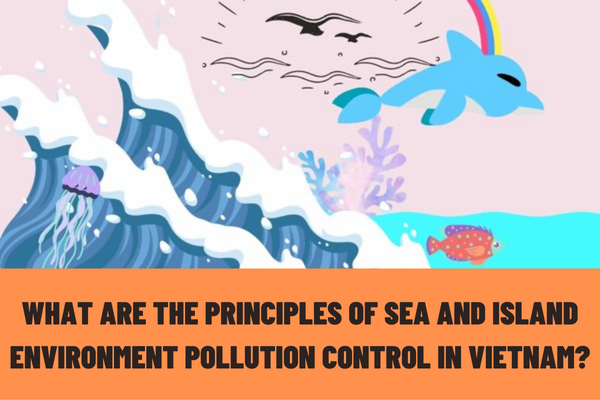What are the principles of sea and island environment pollution control in Vietnam? What are the contents of sea and island environment pollution control in Vietnam?
What are the principles of sea and island environment pollution control in Vietnam?
Pursuant to the provisions of Article 42 of the 2015 Law on Natural resources and Environment of sea and islands in Vietnam stipulating the principles of sea and island environment pollution control as follows:
- Control of sea and island environment pollution must be regularly conducted with the task of prevention being prioritized; carry out early and effective remedy for pollution, sea environment emergencies, degradation of sea and island environment.
- Sea areas must be zoned for risk of pollution to come up with effective solutions for pollution control.
- Waste sources from mainland, activities on sea and islands, waste of unclear origin and from border crossing must be tightly controlled. Control of waste sources, waste matters must involve consideration of loading capacity of sea and island environment.
- Effectively coping with sea environment emergencies and early prevention of spread of pollution.
- Close coordination among relevant sectors, levels, organizations and individuals for control of sea and island environment pollution.

What are the principles of sea and island environment pollution control in Vietnam? What are the contents of sea and island environment pollution control in Vietnam?
What are the contents of sea and island environment pollution control in Vietnam?
Pursuant to the provisions of Article 43 of the 2015 Law on Natural resources and Environment of sea and islands in Vietnam, the contents of sea and island environment pollution control include:
- Carry out investigation, statistical work, classification and assessment of waste sources from mainland, activities on sea and islands; state of environmental pollution;
- Conduct regular monitoring and assessment of current conditions of water, sediments, ecosystems and biodiversity of sea and island areas;
- Conduct investigation and assessment of loading capacity of environment in the areas running high or very high risk of pollution; make public announcement of areas out of capacity to receive waste;
- Prevent, detect, handle and overcome pollution and degradation of environment, ecosystems; improve and remediate environment and ecosystems polluted and degraded;
- Identify level of risk of environmental pollution; zone and map risk of environmental pollution;
- Cope with environmental emergencies;
- Grant permits and control sea dumping;
- Cooperate with state agencies and foreign agencies and organizations in sharing information and assessing sea water environment quality; control cross-border environmental pollution according to law provisions;
- Make public announcement of areas running the risk of environmental pollution, information about water, sediments of sea and island areas;
What sea activities will help control environment pollution?
Pursuant to the provisions of Article 45 of the 2015 Law on Natural resources and Environment of sea and islands in Vietnam, control of environment pollution from sea activities includes:
- Hazardous waste from sea activities must be collected, classified, stored, transported and treated according to regulations on environmental protection.
- Any works, facility on the sea that are no longer used after expiration date must be dismantled and transported to mainland or dumped at sea as prescribed hereof and other relevant law provisions.
- Owners of vehicles transporting and storing petrol, oil, chemicals, radioactive substances, toxins and other substances running the risk of sea environment emergencies must have a plan for prevention and coping with environmental emergencies, ensuring no leakage, loss and spilling.
- Wastewater from ships, drilling rigs, and other works and facilities on the sea; oil sludge and mud containing toxic mixtures from petroleum exploration and extraction must be treated to meet technical regulations on environment before being discharged to sea.
- Ballast water, rinses, washing water, bilge water must be treated to meet technical regulations on environment before being discharged to sea.
- Discharge of ballast water, rinses, washing water, bilge water and other wastewater from ships is instructed in accordance with regulations of the laws on maritime, environmental protection, relevant law provisions and the international agreements to which the Socialist Republic of Vietnam is a signatory.
- Solid waste from ships, drilling rigs, works and other facilities on sea must be closely managed under the laws; mud dredged from navigable channels, ports must be transported to mainland or dumped at sea as prescribed hereof and relevant law provisions.
- Ports must be equipped with a system to receive and process domestic waste, residual oil from vehicles on sea.
- Waste floating on ocean surface or along the shores must be collected, classified and treated according to regulations on environmental protection and relevant law provisions.
LawNet